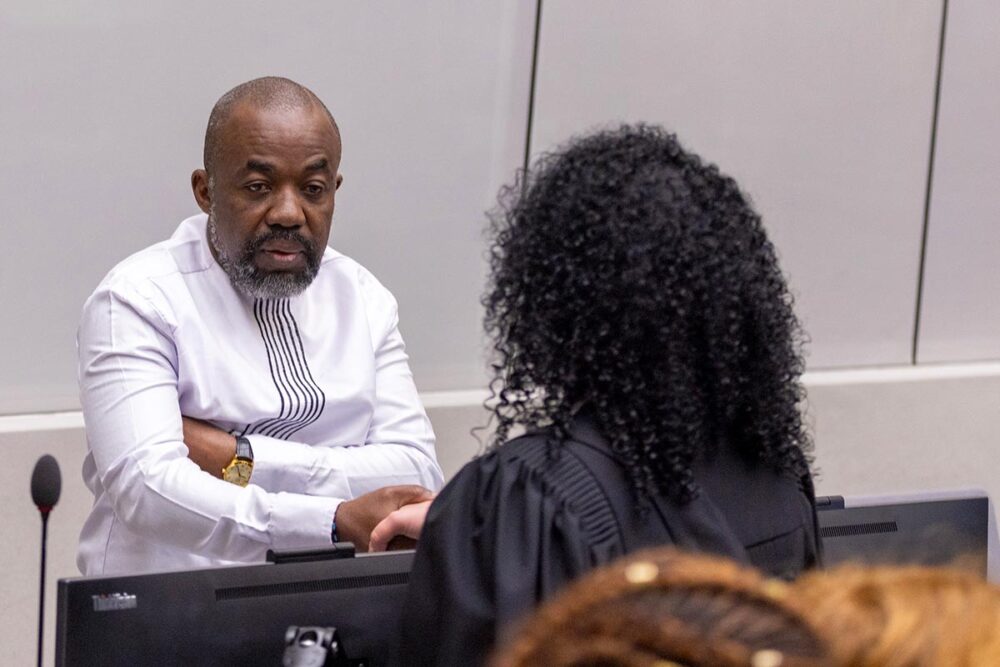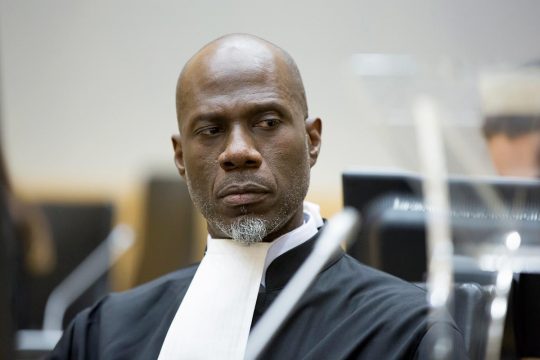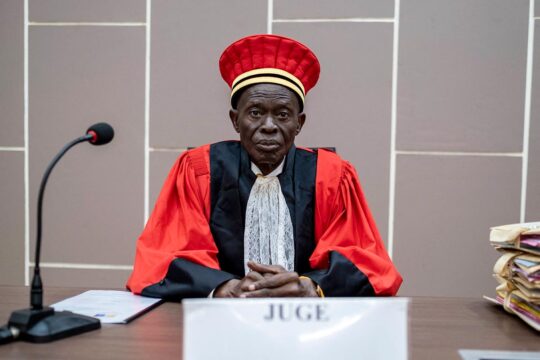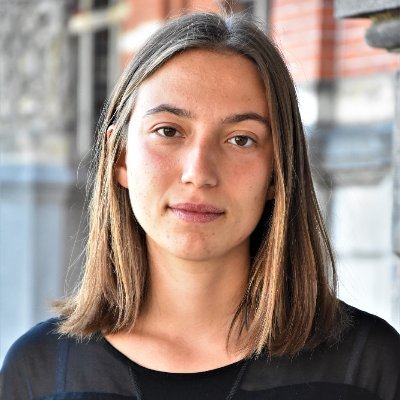“He held his word, he said ‘now it is the time to not have conflict among us but just to respect each other.” This is what the first defence witness in the Alfred Yekatom case recalled of what the defendant said in the prefecture of Lobaye, in the Central African Republic (CAR), at the time of the events judged at the International Criminal Court (ICC) in the Hague.
In 2014, Yekatom was a caporal chef of the Central African army (FACA). Bishop Rino [full name was withheld for safety reasons] in his testimony on 11 December 2023 said that everyone in the town of Mbaiki, where he was running the diocese, was expecting him to come “to get revenge” against the Muslim after the bloody takeover of the Seleka, a predominantly Muslim religious ethnic coalition that ruled CAR between March 2013 and January 2014. But the Italian bishop said in court that Yekatom came and “spoke well of the order he wanted to establish” and of “a good security situation on both sides”, meaning for the Muslim and non-Muslim population.
Yekatom is charged with war crimes and crimes against humanity for organising and overseeing atrocities committed by a group of around 3,000 combatants operating within the Anti-balaka, a self-defence group that opposed the Seleka. The crimes were allegedly carried out between 5 December 2013 and August 2014 in the capital Bangui and the Lobaye area, and include murder, deportation, intentional attack against the civilian population and recruitment of child soldiers. The prosecution said that Yekatom was part of a common plan targeting the Muslim population, with his co-accused Patrice-Edouard Ngaïssona, allegedly the most senior leader of the Anti-balaka militia. The trial opened in February 2021 and both men pleaded not guilty. Ngaïssona has already presented its defense.
“Yekatom tried to bring back peace and security”
Mylène Dimitri, Yekatom’s lawyer, announced a total of 17 witnesses. “Yekatom’s goal was to oust the Seleka and mercenaries, to try to bring back peace and security for civilians,” she said in her opening statements on November 28. “He did not target the Muslim civilian population” and “there was no common plan in Mr Yekatom's group,” she added. The picture Dimitri painted in court is one of “chaos”, where “the hatred of the civilian population kept growing and it divided communities.” And, as described earlier by CAR’s former Prime Minister Nicolas Tiangaye, “the country was in a situation that was out of control."
In this “crisis situation”, continued Dimitri, Yekatom “did not have the control over the people who were not able to control their anger and who attacked Muslims.” Defence witnesses will testify of how he “tried to protect the Muslims”, she said. Dimitri acknowledged the great suffering of the Central African people, “the Christians, the animists, the Muslims”, but to her the vision brought by the prosecutor of “Anti-balaka members versus Muslims, Seleka versus Christians” is a very “simplistic one”, that has ignored “exculpatory evidence.”
Yekatom looked into his computer and took notes, while bishop Rino talked about a “Saint-Jeanne d'Arc meeting” in Mbaiki, when after a year of occupation the Seleka left. The bishop organized it to “create dialogue and try and find solutions to have free movement of people and live in peace” after people sheltered inside their homes out of fear for the Seleka, said Rino. In contrast to everyone’s expectations, in front of community leaders and authorities gathered next to the church, Yekatom spoke of the equal treatment of all communities and of the “respect” and “order” he wanted to establish. “I said, you spoke very well here but now you have to repeat it in front of the people at the city hall,” recalled the bishop. And Yekatom went and spread the same message to the crowd gathered there. “The fact they knew they had a chief like Rambo [popular nickname for Yekatom],” said Rino, meant that the Lobaye area “suffered less damage than elsewhere.”
The prosecutor’s intermediaries strike again
In the second part of her opening remarks, Dimitri focused on “false testimonies”, allegedly provided by “a prosecution intermediary” and other witnesses, to poke holes in the main prosecution theory. This accusation comes after the recent decision by the Office of the Prosecutor to drop its case against Maxime Mokom, a Central African politician. Yekatom and Mokom were “both apparently linked through the prosecution's so-called strategic common plan,” said Dimitri, arguing that the allegations that Yekatom “picked weapons from Maxime Mokom” had therefore “collapsed.”
Dimitri pointed to “intermediary 2580”, who she alleged had falsified a baptism certificate concerning “witness 2475.” She described this protected witness as the prosecution’s “star witness, [an] alleged child soldier” though he had “fabricated evidence and lied under oath.” She said her team has checked parish records to establish the falsification of a birth date – modified from 1994 to 1999. For her, other organs of the ICC supporting witnesses have become complicit in this lie, which “spread the virus.”
“The prosecution kept dancing around this issue, failing to meaningfully test 2475's central claim to have been a child soldier,” Dimitri argued.
Not surprisingly, Dimitri harked back to the first ICC trial, of Congolese rebel leader Thomas Lubanga on charges of enlisting child soldiers - one of the counts levelled against Yekatom. That trial was marked by the controversial intermediaries, recalls Catherine Mabille, Lubanga’s defence lawyer, in an interview with Justice Info. The prosecution‘s first witness in that trial, an alleged former child soldier, abruptly changed his story during his testimony, saying that he had been coached on what to say in court by one of the prosecution’s intermediaries. But despite the judges’ request to the prosecution to charge those responsible for interfering with witness testimony, the then prosecutor Fatou Bensouda did not do so later, because – as she wrote – it would not make any difference to the guilty verdict against Lubanga because it was not based on the false testimony. That lack of consequences, says Mabille, is “why I’m not surprised” to hear about the problem recurring.
“Stuck with the good, the bad and the ugly”
The issue of intermediaries was also part of the collapse of the cases against senior Kenyan politicians. Michael Karnavas, the defence lawyer for late Kenyan lawyer Paul Gicheru, a case where the question of intermediaries would have been central, points out that when the current ICC prosecutor Karim Khan was defence counsel for Kenya’s then vice president William Ruto, he “jumped up and down in court” and even “called for an independent investigator” into witness tampering by intermediaries. The prosecution did initiate cases around the Kenya collapse. One, still outstanding, is against Walter Barasa, a prosecution intermediary and journalist, for allegedly offering money to prosecution witnesses to withdraw testimony. In 2014, a defence witness for Khan’s client was found dead. The prosecution had named the witness as an intermediary in an alleged scheme to corrupt witnesses.
As the issue re-emerges in the Yekatom trial, Karnavas suggests that “due diligence” does not seem to have been followed. “This is harsh,” he says, but “I think part of it is wilful blindness. If it’s music they want to hear, they go along with it.” He points out that the Office of the prosecutor was previously split into investigative and trial teams so that at trial, the trial lawyers “get stuck with the good, the bad and the ugly.” Therefore, he says, it’s up to the lead counsel to recheck and recognise “if something too good to be true, it’s not true.” Of course, this begs a question according to Karnavas: how does the defence find out more than the prosecution? “We are in a rowing boat, they are an armada,” in terms of resources, he says.
The trauma of past acquittals
Despite the difficult history of the prosecution’s use of intermediaries “they did it again,” argues Dimitri, telling the trial chamber that the Office of the prosecutor delegated their investigative responsibilities to witness 2580 “without meaningful supervision.” Because “it's so scandalous,” she says, the defence will “file a motion for exclusion of evidence.” Contacted by Justice Info, the Office of the prosecutor answered in writing that “the prosecutor has placed significant emphasis on the need for the Office to effectively implement article 54 of the Rome Statute requiring the collection of both incriminating and exonerating evidence equally.”
"This court was a source of immense hope for the victims of serious crimes committed in the Central African Republic. What we fear is that there is only a succession of acquittals at the ICC,” wrote Evrard Bondadé, secretary general of the NGO Central African Human Rights Observatory, to Justice Info’s correspondent in CAR. Bondadé referred to the 2021 acquittal of Jean-Pierre Bemba, a former vice-president of Congo prosecuted for crimes committed in CAR, and to the recent dropping of charges in the Mokom case. “As a result, the victims do not have enough confidence in the International Criminal Court. They are still thirsty.”









